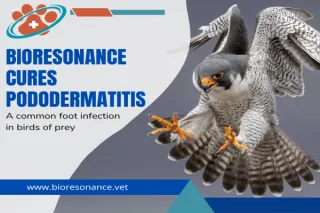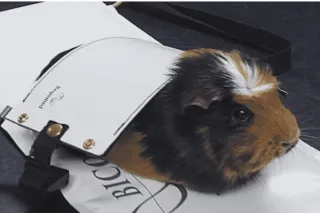
Food allergies and post-vaccinal complications
"Navigate the complexities of food allergies and post-vaccinal complications in pets. Learn about identification, management, and preventive measures. #PetHealth #FoodAllergies #VaccineComplications" ...more
What Vet Says
May 02, 2024•2 min read

Chronic cystitis
Discover the intricacies of chronic cystitis 🩺, a persistent bladder inflammation. Uncover its causes, symptoms, and treatment options for effective management. ...more
Owner Stories
May 02, 2024•2 min read

BICOM® Therapy for falcon with bumblefoot
Discover how BICOM® Therapy is revolutionizing treatment for falcons with bumblefoot. This innovative approach offers a gentle, non-invasive solution. #FalconCare #BICOMTherapy #BumblefootTreatment ...more
Owner Stories
May 02, 2024•2 min read

BICOM® bioresonance therapy: Offering help when all else has failed?
Exploring BICOM® bioresonance therapy: a unique approach that may offer relief when traditional methods fall short. Could this be the alternative solution you've been searching for? #Bioresonance #Alt... ...more
Owner Stories
May 01, 2024•2 min read

Little Schnuffi
Meet Little Schnuffi, the tiny pup with a big heart and an even bigger personality! Follow his adorable adventures and heartwarming journey to find his forever home. 🐾 #AdoptDontShop #PuppyLove ...more
Owner Stories
May 01, 2024•1 min read

A vet takes up the story:
Join us as a dedicated veterinarian shares insights, experiences, and heartwarming stories from the front lines of animal care. 🐾 #VeterinarianPerspective ...more
Owner Stories
May 01, 2024•1 min read
Search Testimonials
It is important to remember that individual anecdotes and testimonials should not be used as the sole basis for making decisions about medical treatments or therapies.
When it comes to alternative therapies like bioresonance, it is essential to rely on evidence-based research and the advice of trained medical professionals. While some people may have positive experiences with bioresonance for their animals, it is important to approach these claims with caution and seek out reliable information from reputable sources.
Ultimately, the decision to pursue bioresonance or any other alternative therapy for your animal should be made in consultation with a veterinarian or animal health professional who can help you weigh the potential benefits and risks.
Pollen – a nuisance for our animal companions too
Hay fever patients are only too familiar with the problem. Year after year the misery begins in the spring with stinging eyes, runny itchy nose and, in severe cases, with a cough and asthma as well. What is perhaps less well known is that our animals too suffer increasingly from this same medical condition.
Just as with humans, the incidence of allergies is also becoming more frequent in animals. Allergic reactions may be provoked by airborne allergens such as pollen, house dust and house dust mites, amongst other factors. Food intolerance is also on the increase, however, and represents a distressing problem for the affected animals.
Now, in spring, as it gets warmer, allergic animals are all suffering as well. With animals it is mainly their skin which itches or else their
noses run more and they occasionally sneeze. Changes in their coats and reddening of the skin are often noticed in the face, feet and ears. These areas often display bloody claw marks and develop into very painful weeping eczema, indicating the severity of the irritation.
This type of problem in animals can be treated with the allergy programs pre-loaded in the Bicom device.
Dr. med. vet. C. May

Facebook
Instagram
Mail